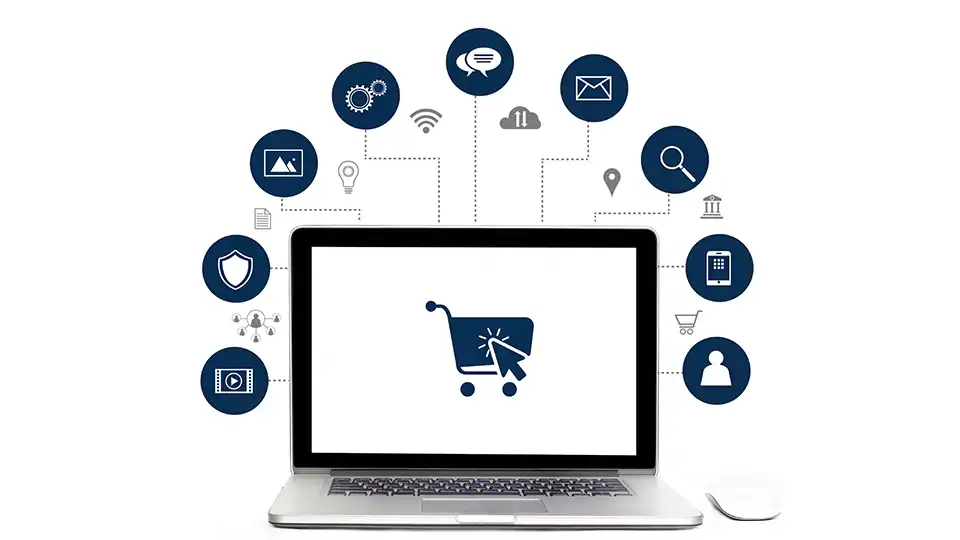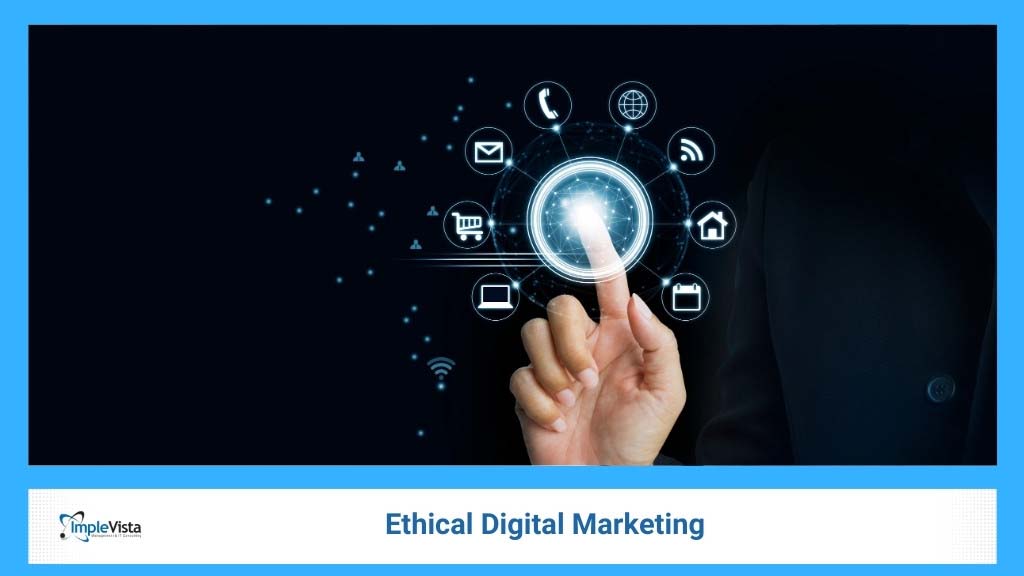The digital age has ushered in unparalleled opportunities for businesses to connect with customers — but it has also raised new questions about ethics and sustainability. Today’s consumers expect more than catchy ads; they demand honesty, responsibility, and respect.
Ethical Digital Marketing integrates sustainability and integrity into every campaign, ensuring that brands communicate transparently and treat data, content, and audiences with care. This approach goes beyond compliance: it builds trust, loyalty, and long-term value.
In this article, we explore what ethical and sustainable digital marketing means, why it matters, and how brands can implement it effectively — all while highlighting Implevista’s own commitment to transparency and trust.
What Is Ethical Digital Marketing?
Ethical digital marketing starts with honesty and integrity in all online communications. It means avoiding deceptive practices and ensuring that every ad, email, and social post reflects truthful information. As one expert puts it, “ethical marketing is about commitment to honesty and integrity in communication with consumers,” respecting their right to privacy and informed choice. In practice, ethical marketing involves:
- Transparent Messaging: Clearly presenting product capabilities, pricing, and terms without hidden fees or fine print. Brands openly disclose sponsorships and avoid exaggerating claims.
- Data Privacy & Consent: Collecting customer data only with explicit permission, storing it securely, and never selling or using it unfairly. Compliance with laws like GDPR or CCPA is a minimum; ethical marketers go further by making data policies easily understandable and giving customers real control.
- Authentic Engagement: Interacting with customers respectfully, not exploiting their vulnerabilities. Marketing content should provide genuine value and avoid sensationalism. For example, content should entertain or inform rather than simply drive impulse buys.
- Inclusive & Respectful Practices: Considering the diversity of the audience and avoiding stereotypes or biases. Ethical campaigns represent all groups fairly and ensure images and messages don’t alienate any community.
Together, these principles ensure that ethical marketing isn’t just about not breaking rules, but about actively doing right by consumers and society. This foundation of trust and accountability makes campaigns more credible and effective.

Why Sustainable and Ethical Marketing Matters
Modern consumers are increasingly conscious. They look for brands that align with their values and hold companies accountable for their actions. Ethical and sustainable marketing drives real business results by:
- Building Trust and Loyalty: Transparent practices foster customer confidence. When brands communicate honestly about products and data, consumers are more likely to stick around and recommend them. Studies show that truthful, social-responsibility-driven campaigns create deeper relationships, leading to repeat business.
- Enhancing Brand Reputation: A commitment to ethics and sustainability sets a brand apart. Consumers notice when companies avoid “greenwashing” and take meaningful action, which boosts credibility. For instance, brands like Patagonia (known for frank eco-claims) have won customer respect by being upfront.
- Appealing to Conscious Consumers: Today’s buyers (especially younger generations) are willing to pay more for eco-friendly and ethical products. Marketing campaigns that highlight genuine sustainability efforts — like energy-saving initiatives or fair sourcing — tap into this demand and attract a loyal customer base.
- Long-Term Growth: Ethical practices reduce the risk of backlash or legal issues (e.g. privacy violations). Over time, this stability translates into sustainable growth. Companies with strong ethics often outperform peers: one report notes that “brands with a solid commitment to sustainability outperform their peers, experiencing higher sales growth and better stock performance”.
By integrating sustainability into digital marketing— for example, minimizing the carbon footprint of online campaigns — companies also demonstrate social responsibility. This further amplifies trust. As Lounge Lizard notes, “Sustainable digital marketing . builds trust with an audience that values authenticity and accountability”. In sum, ethical marketing isn’t a cost center; it’s a competitive advantage.
Core Principles of Ethical Digital Marketing
Implementing an ethical marketing approach requires concrete practices. Key principles include:
- Transparency and Honesty: Businesses must be open about how products work, what they cost, and how consumer data is used. For example, clearly labeling sponsored posts or providing plain-language privacy policies fulfills legal requirements and deepens trust. Transparency extends to pricing, performance claims, and any potential limitations of a product. When consumers see a brand “walking the talk,” trust grows.
- Respecting Consumer Data: With rampant data breaches in the news, respecting privacy is paramount. Ethical marketers explicitly obtain consent for data collection, explain usage policies, and allow easy opt-outs. They also use data responsibly (e.g. anonymizing information, using secure servers) and comply with laws like the GDPR and CCPA. By doing so, they honor customer rights and avoid eroding trust.
- Authentic Engagement: Content should add value. Rather than bombarding users with clickbait, ethical strategies focus on solving problems, telling brand stories, or educating audiences. For instance, blog posts or social updates might provide tips or insights instead of hard-selling products. This authenticity encourages customers to engage willingly, knowing the brand has genuine intentions.
- Inclusive and Non-Discriminatory Practices: Ethical campaigns consider diversity. Marketing materials should respect all segments of the population and avoid stereotypes. This means using inclusive language, accessible design, and imagery that represents varied audiences. Such fairness not only avoids alienating consumers but reinforces a brand’s integrity.
- Avoiding Deceptive Tactics: This includes eliminating misleading ads, clickbait, or dark patterns (tricks that manipulate user behavior). Instead of sensational headlines that disappoint upon click, ethical marketers craft accurate, relevant content. Roger West emphasizes that “while clickbait may yield short-term results, it often leads to long-term damage to consumer trust”. Sustaining trust requires clarity and alignment between promise and reality.
These principles form the basis of any ethical marketing policy. They ensure campaigns are not only effective but also principled.

Sustainable Digital Marketing Strategies
In addition to ethics, sustainability in digital marketing focuses on environmental impact. Sustainable practices minimize resource use and highlight a brand’s eco-friendly commitments. Examples include:
- Eco-Friendly Campaigns: Highlight green initiatives in marketing itself. For example, a brand might showcase efforts like using recycled materials or offsetting carbon. Campaigns can include behind-the-scenes stories of sustainability efforts, reinforcing authenticity. Lounge Lizard notes that effective eco-campaigns “demonstrate a brand’s commitment to environmental responsibility and can encourage similar behavior in consumers”.
- Reducing Digital Carbon Footprint: Digital ads and content consume energy (through data centers, user devices, etc.). To mitigate this, marketers can optimize media: compress images, avoid auto-play videos, and target ads more precisely to reduce unnecessary impressions. For instance, trimming ad file sizes or limiting video length cuts energy use. As consumers become aware of “digital CO₂,” such optimizations can also become a selling point.
- Sustainable Content Creation: Adopt digital minimalism. Instead of churning out content in volume, focus on high-quality pieces with lasting value. This reduces waste (less server load, fewer notifications) and resonates with audiences seeking substance. By prioritizing evergreen blogs or infographics over ephemeral posts, marketers can maintain impact while honoring the planet.
- Green Hosting and Technology: Wherever possible, use renewable-energy-powered servers or carbon-neutral platforms for websites and ad delivery. A sustainable digital agency encourages clients to choose web hosting with green credentials and uses efficient coding to minimize load times (which saves energy).
- Transparent Sustainability Claims: When advertising an eco-friendly product or process, be clear and honest. Avoid vague buzzwords like “green” without proof. Lounge Lizard warns against greenwashing: brands must “ensure that all sustainability claims are substantiated” to maintain credibility. Providing real metrics (e.g. “this campaign was run on 100% renewable energy”) can further strengthen consumer confidence.
These sustainable methods align marketing with broader environmental values and reinforce transparency. As the 51toCarbonZero report notes, “Transparency is crucial for a sustainable digital marketing agency” — honest reporting on impact builds trust with eco-conscious clients.
Building Trust Through Transparency
Transparency is the foundation of trust. In practice, this means making processes and results visible to stakeholders. For digital marketing, trust-building can involve:
Providing clear analytics and reporting. Implevista’s SEO team, for example, treats “transparency and continuous improvement” as core values. Clients receive detailed reports on website traffic, conversion rates, and ROI. This data-driven openness shows that campaigns are working — or where they can improve. When customers see the numbers, they feel included in decision-making.
Open communication about strategies. Ethical marketers explain why they choose certain tactics and what to expect. For example, if a campaign shifts focus or budget, the team informs the client immediately rather than hiding results. This day-to-day honesty, echoed in Implevista’s partnership approach (“open communication and ethical decision-making”), prevents misunderstandings and cements trust.
Showcasing proof of efforts. Brands can publish sustainability or ethics reports, case studies, and testimonials. When a company transparently shares its progress — success stories and lessons learned — it demonstrates accountability. This could include publishing a live dashboard or blog series on campaign outcomes. The image above symbolizes how data transparency (charts on screen) reinforces a brand’s integrity.
Ensuring accountability in audits and compliance. For instance, stating clearly that marketing follows all legal standards (GDPR consent logs, truth-in-advertising laws, etc.) reassures audiences. Implevista’s content frequently highlights its adherence to “ethical practices and transparency”, showing clients that regulations are taken seriously.
By practicing transparency at every stage, digital marketers turn campaigns into conversations. Consumers feel respected and informed, which deepens loyalty. As CatchMarkit observes, “consumers are increasingly aware of how their data is used, and trust is a critical currency”. In short, transparent marketing is self-fulfilling: it earns the very trust it advertises.

Implementing an Ethical Online Marketing Plan
To put ethics into action, brands can follow these steps:
Conduct an Ethics Audit: Review current marketing materials, data policies, and tech. Identify any misleading content, privacy concerns, or sustainability gaps. This baseline assessment highlights priorities (e.g., updating a confusing privacy notice or removing a deceptive claim).
Set Clear Guidelines: Develop a digital marketing code of conduct. Define standards for honesty, privacy, inclusivity, and environmental considerations. For example, pledge not to use clickbait titles or to use consent-driven email lists. Company-wide values (like Implevista’s commitment to transparency) should inform this policy.
Train the Team: Ensure everyone from writers to ad managers understands ethical standards and legal requirements (such as GDPR, FTC endorsement guidelines, etc.). Educate them on identifying bias, avoiding stereotypes, and respecting data. Regular training sessions or checklists can keep the team aligned.
Leverage Ethical Tools: Use platforms that support transparency. This might mean employing a consent management platform (as part of your technology stack) or analytics dashboards that clients can view. It also means disabling features like auto-playing videos that eat unnecessary bandwidth and energy.
Measure and Report: Use metrics that reflect ethical goals. In addition to ROI, track customer feedback, satisfaction scores, and engagement authenticity. For instance, track opt-out rates, comment sentiment, or brand sentiment analysis. Then, share these insights in regular reports. As CatchMarkit notes, ethical marketing should show results in KPIs like customer loyalty and brand sentiment.
Iterate and Improve: Ethical marketing is an ongoing process. Stay updated on regulations (e.g. new privacy laws) and on what audiences care about. Continuously refine campaigns: fix any unintentional biases, correct errors, and celebrate improvements publicly.
By following these steps, businesses can systematically make their online marketing more responsible. Importantly, this approach isn’t “nice to have” — it’s part of meeting modern consumer expectations.
Benefits of Ethical and Sustainable Marketing
Adopting these practices yields clear benefits:
- Greater Customer Trust: When customers see consistent honesty, they feel secure. Ethical campaigns “build consumer trust” because audiences know they won’t be deceived. Trust leads to long-term loyalty and word-of-mouth promotion.
- Stronger Brand Image: Socially responsible and transparent brands stand out positively. Consumers remember and support companies known for fairness and environmental stewardship, which in turn boosts reputation. As CatchMarkit explains, ethical marketing positions a brand as a leader in its industry.
- Better Engagement and Loyalty: Ethical content resonates. Engaged communities are built on value, not gimmicks. For example, social media strategies that “share client testimonials, product showcases, and industry insights” not only inform but also build trust. This leads to more meaningful interactions and repeat visits.
- Improved Performance: Believe it or not, ethics can help the bottom line. Sustainable agencies help clients “align with consumer values” and tap into a growing market of eco-conscious buyers. Over time, this alignment pays off in higher customer lifetime value.
- Regulatory Peace of Mind: Ethical practices reduce risk of fines or scandals. By proactively following privacy laws and truth-in-advertising rules, businesses avoid costly penalties and negative publicity. (Nobody wants a data breach or deceptive-ad lawsuit.)
In sum, ethical and sustainable marketing builds a “foundation of trust, loyalty, and long-term success”. It’s not just good morals — it’s good business.

Implevista’s Commitment to Transparency and Ethics
At Implevista Digital Marketing, we walk the talk. Our agency operates on core values of transparency, integrity, and accountability. For example, in our SEO practice we only use white-hat techniques that align with search-engine rules and provide lasting results. This means no keyword stuffing or hidden redirects — just honest optimization that steadily improves rankings.
Moreover, we provide all clients with in-depth reports and analytics. As one of our SEO service pages notes, “Transparency and continuous improvement are core to our SEO services”. We share performance metrics openly so you always know exactly how campaigns are performing.
Across all services – from social media marketing to PPC advertising – we avoid manipulative tactics. Our Social Media Marketing team creates authentic content and engages in two-way communication, highlighting real success stories and patient testimonials (in the case of healthcare clients, for instance).
We also develop sustainable campaign strategies, recommending eco-friendly hosting and efficient ad targeting where possible. In short, we integrate ethics into every strategy step.
Whether you need SEO, social media marketing, content creation, or any online marketing solution, Implevista’s approach ensures your brand’s values shine through. Check out our Social Media Marketing services or SEO services for examples of how we blend performance with principles. We’re ready to help you run campaigns that not only perform but also reflect your commitment to honesty and sustainability.
Ethical and sustainable digital marketing isn’t a fad — it’s the future. By prioritizing transparency, respecting user privacy, and embracing eco-friendly strategies, brands can build genuine trust and achieve long-term success. As we’ve seen, honest communication, authentic engagement, and clear reporting lay the groundwork for loyal customers and a positive reputation.
Now is the time to put these ideas into action. Whether you’re refreshing your content guidelines or rethinking your ad targeting, taking even small steps toward ethics and transparency will pay off.
Ready to make your marketing more ethical and effective?
Contact Implevista today to discuss a customized strategy. Explore our Digital Marketing Services to see how we can incorporate sustainability and honesty into your campaigns. Don’t miss more expert tips – subscribe to the Implevista Blog and check out our post on Building Long-Term Partnerships to learn how trust drives every business success. Let us help you build digital marketing campaigns that your audience can truly trust!

FAQs: Ethical & Sustainable Digital Marketing
Q: What is ethical digital marketing?
A: Ethical digital marketing means conducting online marketing with honesty, integrity, and respect for consumers. It involves transparent ads, truthful product information, and responsible use of data. In practice, it means avoiding clickbait, respecting privacy (GDPR-compliant data collection), and engaging customers authentically.
Q: Why is transparency important in digital marketing?
A: Transparency builds trust. When brands openly share how they advertise, how they use data, and what their products truly offer, customers feel respected. Transparent practices (like clear privacy policies or disclosing sponsored content) reduce skepticism and increase loyalty. In fact, experts say transparency and authenticity are “essential pillars” in modern marketing.
Q: How does ethical marketing build customer trust?
A: Ethical marketing builds trust by aligning messaging with reality. When marketing claims are accurate and backed by facts, customers feel the brand is honest. Similarly, protecting customer data and respecting privacy shows respect for user rights. Over time, these practices nurture loyalty: consumers remember brands that tell the truth and treat them fairly.
Q: What are some sustainable digital marketing practices?
A: Sustainable digital marketing focuses on reducing environmental impact. This includes using eco-friendly hosting, optimizing ads and media to consume less energy, and highlighting a brand’s green initiatives in campaigns. For example, limiting video auto-play and compressing images reduce digital waste. Brands also avoid “greenwashing” by substantiating their eco-claims. These tactics minimize carbon footprint while appealing to eco-conscious customers.
Q: Can digital marketing be both effective and ethical?
A: Yes! In fact, ethical practices often improve effectiveness. When customers trust your brand, they engage more with content and stay loyal. Ethical marketing avoids short-term gimmicks (like clickbait) that might backfire, focusing instead on quality content and targeted campaigns. Studies show that companies committed to sustainability and ethics can outperform competitors, enjoying higher customer loyalty and better reputation.
Q: What is greenwashing and how can I avoid it?
A: Greenwashing is when a company exaggerates or fabricates its environmental efforts in marketing. To avoid it, be factual and specific: if you claim a product is “eco-friendly,” explain how (e.g. made from recycled materials). Only use sustainability buzzwords when you have proof, and always use clear evidence or certifications. Authenticity here prevents damage to your brand’s credibility.
Q: How does data privacy fit into ethical marketing?
A: Data privacy is a cornerstone of ethical marketing. Ethical marketers gather personal data only with consent, use it responsibly, and protect it with strong security. Compliance with laws (like GDPR or CCPA) is required, but ethical businesses go further by making privacy policies clear and giving users control. Respecting privacy demonstrates integrity and prevents trust breaches.
Q: Why should businesses use ethical digital marketing?
A: Businesses benefit from ethics in marketing through enhanced customer relationships. Customers today are more informed and value-driven; they tend to support brands they perceive as honest and responsible. Ethical marketing reduces the risk of backlash (legal or public relations issues) and can even be a selling point itself. In essence, it aligns the company’s values with customer expectations, driving sustainable growth.
Q: How can I measure the success of ethical marketing?
A: Beyond standard KPIs (like traffic or conversions), track metrics tied to trust and engagement. These include customer retention rates, net promoter score (NPS), social media sentiment, and email opt-in rates. Monitor brand mentions and feedback to see how audiences perceive your honesty. Catch Markit suggests using tools to gauge brand sentiment and loyalty as indicators of ethical success.
Q: Are there regulations that enforce marketing ethics?
A: Yes. Laws like the GDPR, CCPA, and digital advertising standards mandate elements of ethical marketing (especially around data privacy and truth in ads). However, ethical marketing goes beyond legal compliance: it’s about voluntarily adopting best practices that respect consumers and society. Staying updated on regulations and following industry guidelines (e.g. FTC endorsement rules for influencers) helps ensure campaigns remain both ethical and lawful.





